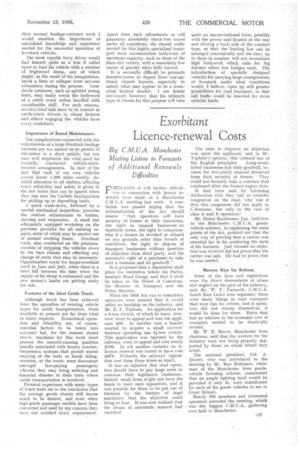Exorbitant Licence-renewal Costs
Page 81

If you've noticed an error in this article please click here to report it so we can fix it.
Big C.M.U.A. Manchester Meeting Listens to Forecasts of Additional Renewals :Difficulties FOR.ECASTS of still further difficutties in connection with licence renewals were made at a Manchester C.M.U.A. meeting last week. A resolution was passed urging that the administration of the Act should ensure " that operators will have security of tenure in their, businesses,' the right to expand businesses On equitable terms, the right to compensation if a licence he revoked or refused on any grounds other than breach of conditions, the right to dispose of transport businesses without question of objection from third party, and the automatic right of a purchaser to -take over a business and its goodwill." •
It is proposed that a deputation shall place the resolution before, the Parliamentary Road Group, and that it shall be taken to the House of Commons, the Minister of Transport and the Prime Minister.
When the 1933 Act was in committee operators were assured that it would inflict no hardship on the industry, said Mr, E. F. Topham. An application for a 5-ton vehicle, of which he knew, however, went to appeal and cost the applicant £.60. In another case a haulier wanted to acquire a small carriers' business operating one 2i-ton vehicle. This application was opposed by the railways, went to appeal and cost nearly £100. In yet another instance an Alicence renewal was stated to have cost £475. Probably the railways' opposition cost them three times as much.
It was an injustice that road operators should have to pay large sums to continue their legitimate businesses. Indeed, small firms might not have the funds to meet such opposition, and it was possible for them to be put out of business by the battery of legal machinery that the objectors could bring to bear. It was now realized that the dream of automatie renewal had vanished. The onus to disprove an objection was uppir the applicant, and in Mr.
Topham's opinion, this violated one of the English principles. Long-estab lished businesses lost their goodwill, because the two-yearly renewal detracted from their security of tenure: They coulchnot honestly fake a contract that continued after the licence expiry 'date,
It had been said by Licensing Authorities that they had to eel-Oder congestion on the road; why was it that this congestion did not apply. to C-licensees, -but only -in the case of class 'A :and. B operators?
Mr. Henry Backhouse,Jun. (solicitor to the, Manchester. C.M.(i.A, goodsvehicle scheme), in explaining the main points of the ,Act, pointed out that the only way of proving that a carrier was essential lay in his producing the facts of his business. just because no objec, tion was received did not prove that the carrier was sale. lie had to prove that he was needed.
Matters Ripe for Reform.
Some of the laws and regulations were the direct descendants of abuse and neglect on the part of the industry, said Mr, W. F. Farnorth, South East Lanes area organizer; there were many things in road transport that were ripe for reform, and if operators did' not reform themselves, it would be done for them. Rates that had no relation to the economic cost of transport needed to be drastically revised.
Mr. W E. Macve, Manchester Area chairman, said that the workers for the industry were not being properly supported by those on whose behalf they acted.
The national president, Col. A. Jerrett, who was introduced to the meeting by Mr. Max Robinson, chairman of the Manchester Area goodsvehicle licensing scheme, commented that an ample fighting fund would be provided if only 5s. were contributed for each of the -goods vehicles in use in Great Britain.
Nearly 700 members and interested operators attended the meeting, which was the biggest C.M.U.A.-. gathering ever held in Manchester.








































































































































































